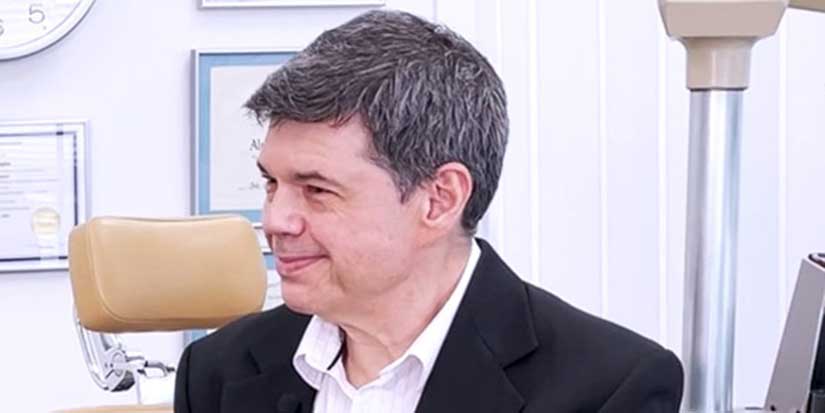Latest News
Alex Hupka offers patients 50 years of experience

Published 12:07 PDT, Fri May 10, 2024
—
Richmond Sentinel, Jim Gordon (JG) filmed an interview on location at the office of Esthetics Denture Studio. This is the beginning of a series for our senior citizens and what services and programs are available to keep our seniors active, healthy and informed. To start this project off, we were curious to learn about what a dental technician or dental engineer’s role is and who better provide this information then from someone with nearly 50 years of experience.
Alex Hupka (AH) is a registered denturist and registered dental technician who has been offering his service to patients for nearly 50 years.
• 1976 he started his career in Winnipeg as a dental technician.
• 1987 he owned and operated a full-service dental laboratory for eleven years in Winnipeg.
• 1998 he moved from Winnipeg to Vancouver when he was offered a teaching position at Vancouver Community College.
• 2005 he was honoured with Denturist of the Year award.
Alex maintains a relaxing and welcoming environment in his Richmond clinic and is well known for his great service and his friendly manner and says, “beautiful smiles are created by artisans at Esthetics Denture studio.”
JG: We're here in Alex's office at Esthetics Denture Studio, and Alex is actually sitting in the patient's chair.
AH: I am.
JG: I wanted to start out with—can you explain to our viewers the difference between a dentist and a dental technician.
AH: A dental technician is somebody who works by prescription to the dentist, they’re highly skilled people, and they will do everything from implants, orthodontics, dentures, and partial bridges. A denturist is somebody who works on a patient, and everything that's removable.
As a technician, I have the ability to engineer a lot of implant bars and design crowns, so when the dentist is doing restorative work, we can be designing crowns or a removable partial and the crown I design will interlock with the partial if required.
JG: If I'm going to a dentist or a viewer is, do we contact you directly or does the dentist refer us if for example, we wanted a partial bridge.
AH: We have a lot of dentists that refer their patients to us. The neat thing is they'll see some of my work on a patient and the next thing you know they're sending us referrals.
JG: As we said earlier you are originally from Winnipeg, what brought you to Vancouver.
AH: I had a laboratory for years and I sold it. The next step was to become a denturist because I enjoyed working on patients. When I had my laboratory, I would quite often go out to the dentist office. I have thousands of chairside hours working with the dentists.
With my credentials I was offered a teaching position in dental technology at Vancouver Community College and the rest is history.
JG: Alex can you talk about just some of the advancements in technology. You said to me off camera, that the digital aspect is something that was in high demand, but now all of a sudden people are moving away from that experience.
AH: I think they're not satisfied with the ease of use. I've heard of people buying these machines and then it just sits in the office. What people are looking for is more of what I offer. We actually measure the patient’s skull and upper and lower jaw and duplicate the images on our technology and through the art of our design the results are—if it's good enough to fool me if I meet you, that's the level I like to work at.
I use what we call cephalometric, which is the measurement of the skull, the shape of your forehead, the angles of your forehead and the profile of your face. In other words, we evaluate the dental and skeleton relationship of the human skull. We also review the white part of your eyes, which is the sclera that gives you the base tones for the tooth.
JG: Let's talk about all that you offer here for our viewers at Esthetics Denture Studio.
AH: We offer full dentures, partial dentures, precision dentures or if you want to get something that's removable, we can build it. If you have implants, and we need to build a substructure and then a superstructure, there’s absolutely no problem engineering it.
JG: So, if were not coming to you say, through a dentist, can people reach out to your office directly.
AH: Absolutely. We also have many dentists that we can refer patients to.
The dentists we work with I love dealing with. They're very precise, which is important.
JG: A lot of your patients are seniors and because people are living longer, do you find yourself creating, say, two or three different types of dentures for a person as they age into their seventies, eighties, and even in their nineties or their hundreds?
AH: I do actually, and my patients love coming back. Essentially the dentures do hold up, except they're now worn down just from attrition. The neat thing is some of the patients that we have are in their seventies and eighties and nineties. They look amazing. People are living much, much longer.
JG: You were telling me off camera before we started that along with creating dentures, you also advise your patients, about what to eat and not to eat and why, especially as they're getting older.
AH: If you're eating a lot of nuts or a lot of fibrous vegetables you will wear out the teeth faster. However, you can't stop a patient. The other thing we also ask people to do is, not to wear their dentures when they go to bed because when they sleep on their side, they could wear them out and they can also wear down bone a little faster. There are many patients whose spouses have never seen them without dentures. So those patients, I tell them the importance of hygiene before bed and in the morning.
For the video interview in full, go to richmondsentinel.ca/videos































